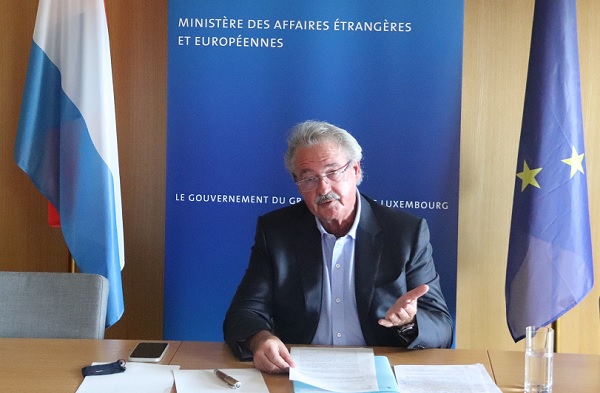 Minister Jean Asselborn;
Minister Jean Asselborn;
On Thursday 7 October 2021, Luxembourg's Foreign and European Affairs Minister, Minister of Immigration and Asylum, Jean Asselborn, participated in the High Level Forum on the Protection of Afghans at Risk, which was held by videoconference.
The meeting - organised by the European Commission at the express request of Minister Asselborn during the discussions on Afghanistan of the Justice and Home Affairs Council on 31 August - brought together the Ministers of Home Affairs and/or Foreign Affairs of 20 EU Member States and associated countries. Co-chaired by the European Commissioner for Home Affairs, Ylva Johansson, and the High Representative of the European Union for Foreign Affairs and Security Policy, Josep Borrell, the meeting was opened by Filippo Grandi, High Commissioner of Nations United for Refugees (UNHCR), and António Vitorino, Director General of the International Organisation for Migration (IOM), who provided an overview of the situation on the ground and protection needs for Afghan nationals, also both in the country itself and in neighbouring third countries. In the ensuing panel discussion under the theme “Mobilising support for Afghans at risk”, Minister Asselborn was among the first speakers to help kick off the discussions.
In his speech, the head of Luxembourg's diplomacy first of all wanted to stress that the current situation in Afghanistan requires an “imminent and coordinated response” from international partners, recalling that solutions must be put in place in the short term and long term, as well as avenues of protection for the most vulnerable.
The minister also recalled that the neighbouring countries of Afghanistan, such as Pakistan and Iran, have been hosting Afghans for years. In this context, it should go without saying that “the international community is showing solidarity in its response to the dramatic consequences of the current situation in Afghanistan. As the European Union, we should be at the heart of these efforts".
Jean Asselborn then referred to the example and experiences of Luxembourg in this area. While welcoming people from different backgrounds and of diverse origins obviously poses certain challenges, the Minister highlighted Luxembourg's conviction that "diversity also enriches the host country".
Regarding reception, the Minister recalled that Luxembourg has doubled its reception capacities since 2015, going from 2,000 beds in 2015 to 4,000 beds in 2021. Since August, Luxembourg has undertaken numerous efforts to assist both Luxembourg residents of Afghan origin and vulnerable Afghan nationals. In cooperation with European partners, and in particular the Benelux countries, more than 40 people were evacuated. The evacuees also included staff from the European Union delegation in Kabul and NATO, as well as their families. In addition, the Luxembourg authorities are currently processing the admission of 30 other people. Jean Asselborn also took the opportunity of this forum to announce that Luxembourg is ready to initially welcome 50 additional Afghan nationals at risk. The focus will be on family reunification.
To conclude, the minister pleaded for stronger European coordination and spoke in favour of the creation of a multi-year support programme for the Afghans, which should be endowed with sufficient financial and operational assistance outside the program of classic relocation.








